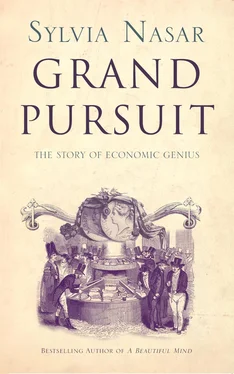Among these unspeakable reflections was the image of a volcano on the verge of eruption. “Do you devour those marvelous revelations of the inferno of misery, of wretchedness, that is smoldering under our feet?” Douglas Jerrold, then editor of Punch and Mayhew’s father-in-law, asked a friend. “To read of the sufferings of one class, and the avarice, the tyranny, the pocket cannibalism of the others, makes one almost wonder that the world should go on.” 82
Mayhew’s series in the Morning Chronicle, “Labour and the Poor,” ran for the entire year of 1850. When about half of the articles had run, he revealed his larger ultimate aim. He wanted to invent, he confessed, “a new Political Economy, one that will take some little notice of the claims of labour.” He justified his ambition by suggesting that an economics that did “justice as well to the workman as to the employer, stands foremost among the desiderata, or the things wanted, in the present age.” 83
Carlyle’s friend John Stuart Mill had given precisely the same reason for embarking on his Principles of Political Economy, published in 1848, only two years earlier, and already the most-read tract on economics since Adam Smith’s The Wealth of Nations.
“Claims of Labor have become the question of the day,” Mill wrote during the Irish potato famine in 1845, when he conceived the idea for the book. 84At the time, the thirty-nine-year-old Mill had long been in love with Harriet Taylor, an unhappily married intellectual whom Carlyle described as “pale . . . and passionate and sad-looking” and a “living Romance heroine.” 85As Mill’s frustration over Harriet’s husband’s refusal to grant her a divorce grew, so did his sympathy with her Socialist ideals.
In taking up political economy, Mill hoped to overcome Carlyle’s objection that the discipline was “dreary, stolid, dismal, without hope for this world or the next” 86and Taylor’s that it was biased against the working classes. Agreeing with Dickens, Mill saw a particular need to “avoid the hard, abstract mode of treating such questions which has brought discredit upon political economists.” He blamed them for enabling “those who are in the wrong to claim, & generally to receive, exclusive credit for high & benevolent feeling.” 87
Mill no doubt had in mind David Ricardo, the brilliant Jewish stockbroker and politician who took up economics as a third career at age thirty-seven. Between 1809 and his untimely death in 1823, Ricardo not only recast the brilliant but often loosely expressed ideas of Adam Smith as an internally consistent, precisely defined set of mathematical principles but also proposed a remarkable number of original ideas concerning the benefits of trade for poor as well as rich nations and the fact that countries prosper most when they specialize. Nonetheless, many potential readers of his On the Principles of Political Economy and Taxation were as repelled by Ricardo’s tendency to convey his ideas in abstract terms as by his dour conclusions. His iron law of wages—stating that wages may go up or down based on short-run fluctuations in supply and demand but always tend toward subsistence—incorporated Malthus’s law of population and ruled out any meaningful gains in real wages. 88
Mill noted that Ricardo, Smith, and Malthus were all vocal champions of individual political and economic rights, opponents of slavery, and foes of protectionism, monopolies, and landowner privileges. He himself favored unions, universal suffrage, and women’s property rights. In response to the economic crisis and social strife of the Hungry Forties, he advocated the repeal of the 50 percent tax on imported grain. The typical laborer spent at least one-third of his meager pay on feeding himself and his family. Mill correctly predicted that once the tax on imports was abolished food prices would decline and real wages would rise. Yet even he remained profoundly pessimistic about the scope of improvements in the lives of workers. Like Carlyle, he was convinced that the repeal of the Corn Laws would only buy time, as the invention of the railroad, the opening up of the North American continent, and the discovery of gold in California had. Such developments, while beneficial, could not repeal the immutable laws by which the world was governed.
Malthus’s law of population and Ricardo’s iron law of wages and law of diminishing returns—the notion that using more and more labor to farm an acre would produce less and less extra output—all dictated that population would outrun resources and that the nation’s wealth could be enlarged only at the expense of the poor, who were doomed to spend “the great gifts of science as rapidly as . . . [they] got them in a mere insensate multiplication of the common life.” 89Government could do no more than create conditions in which enlightened self-interest and laws of supply and demand could work efficiently.
For Mill, economies are governed by natural laws, which couldn’t be changed by human will, any more than laws of gravity can. “Happily,” Mill wrote as he was finishing Principles in 1848, “there is nothing in the laws of Value which remains for the present or any future writer to clear up; the theory of the subject is complete.” 90
Henry Mayhew, for one, refused to accept this conclusion. By his lights, Mill had failed in his attempt to turn political economy into a “gay science,” that is, a science capable of increasing the sum of human happiness, freedom, or control over circumstances. 91The fact that Mill had not jettisoned the iron law of wages was all the more reason for trying again. Ultimately, Mayhew did not succeed in mounting a challenge to the classical wage doctrine, and neither did anyone else of his generation. Still, his landmark series on London labor became the unofficial Baedeker for a younger generation of “social investigators” who were inspired by his reporting and shared his desire to learn how much improvement was possible without overturning the social order.
In August 1849, less than two years after Karl Marx had arrived in London amid a cholera epidemic, the whole world seemed to be descending upon his sanctuary to see the Great Exhibition. The first world’s fair was the brainchild of another German émigré, Queen Victoria’s husband, Prince Albert, but Marx, who was by then living with his wife, Jenny, their three young children, and their housekeeper in two dingy rooms over a shop in Soho, wanted nothing to do with it. He fled to seat G7 in the high-domed reading room of the British Museum with its cathedral-like gloom and refreshing quiet. Ignoring breathless newspaper accounts about the construction of the Crystal Palace in Hyde Park, Marx filled notebook after notebook with quotations, formulas, and disparaging comments as he pored over the works of the English economists Malthus, Ricardo, and James Mill, the father of John Stuart Mill. Let the philistines pray in the bourgeois Pantheon, he told himself. He would have no truck with false idols.
In May 1851, Karl Marx was no longer the dreamy young university student who spent days holed up in his dressing gown writing sonnets to a baron’s daughter, or the louche journalist who drank all night in Paris cafés. In the ten years since he had obtained his mail-order doctorate from the University of Jena, he had squandered a surprise inheritance of 6,000 francs from a distant relative. He had started three radical journals, two of which had folded after a single issue. He had never held a job for more than a few months. While his erstwhile protégé, Engels, had produced a best seller, his own magnum opus remained unwritten. He had published, but mostly long-winded polemics against other Socialists. At thirty-two, he was just another unemployed émigré, the head of a large and growing family, forced to beg and borrow from friends. Luckily for him, his guardian angel, Engels, had promised to pursue a career at his family’s firm expressly so that Marx could focus on his book full-time.
Читать дальше












